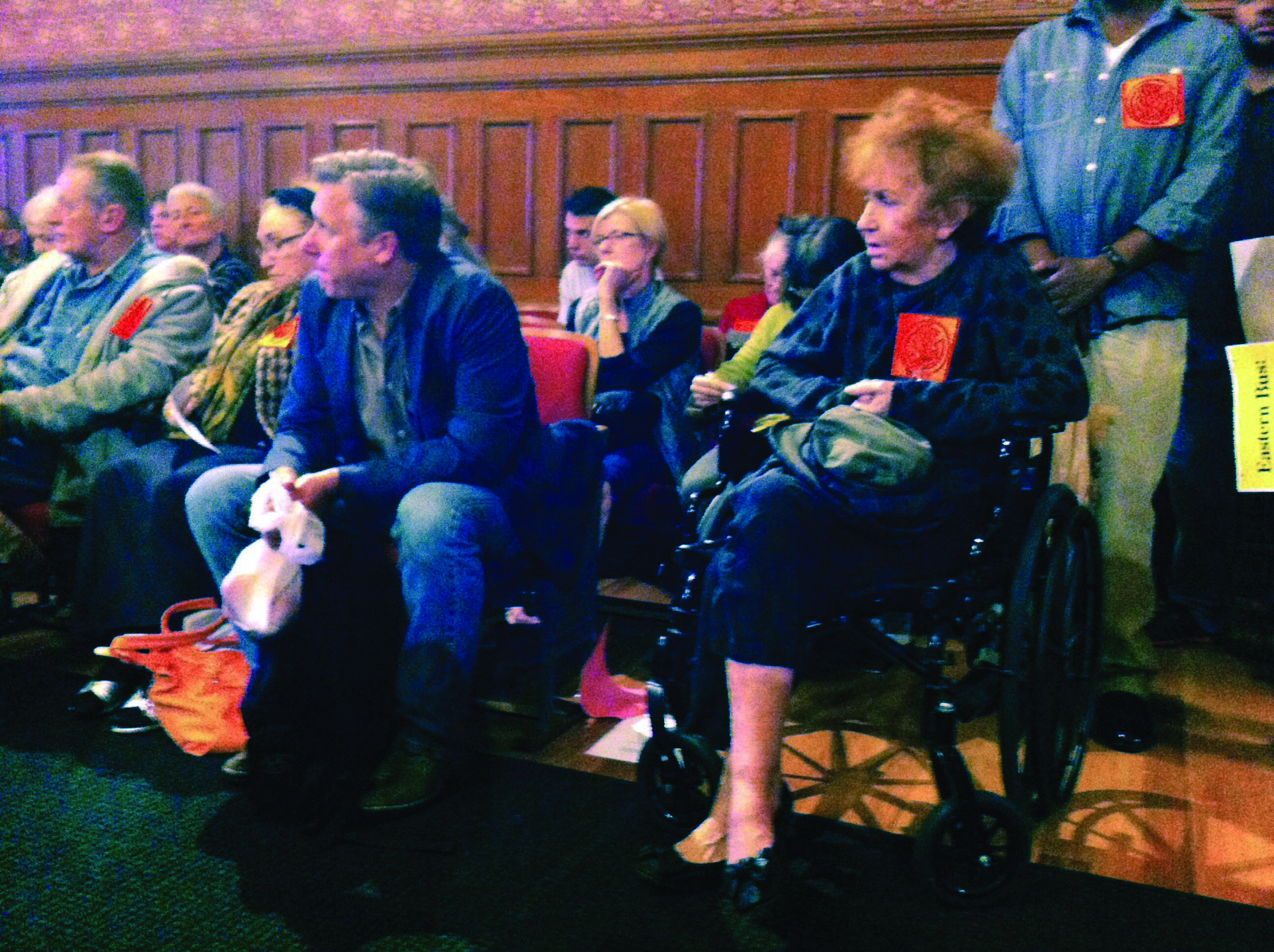
News
Cambridge Residents Slam Council Proposal to Delay Bike Lane Construction

News
‘Gender-Affirming Slay Fest’: Harvard College QSA Hosts Annual Queer Prom

News
‘Not Being Nerds’: Harvard Students Dance to Tinashe at Yardfest

News
Wrongful Death Trial Against CAMHS Employee Over 2015 Student Suicide To Begin Tuesday

News
Cornel West, Harvard Affiliates Call for University to Divest from ‘Israeli Apartheid’ at Rally
Residents Try To Smoke Out Public Housing Smoking Ban at City Council Meeting

The Cambridge City Hall chamber was a spectacle of yellow and red stickers and posters as United Steelworkers Union school bus drivers as well as opponents of the Cambridge Housing Authority’s public housing smoking ban came out in full force to Monday’s City Council meeting to advocate for their respective issues.
After a nearly two-hour-long public hearing and lengthy debate, the Council unanimously adopted Vice Mayor E. Denise Simmons’s amended policy order strongly urging the CHA to continue public discussion of the smoking ban until August 2014, when the ban is scheduled to go into effect. The original version of the policy order had urged the CHA to reopen the public decision about the issue.
Smoking ban opponents, who were in favor of re-opening or at least continuing discussion on the smoking ban, pointed to what they described as flaws in the survey that the CHA cites as evidence of public housing tenant support for the ban.
The survey states that 79 percent of surveyed residents support the smoking ban, but ban opponent Jean Hannon argued that there were too few respondents for the survey results to be meaningful.
“The 79 percent is 79 percent of 538. It is not 79 percent of 25,000 households or 38,000 residents, so that the 79 percent in support of the policy actually drops to 11 percent,” Hannon said during public hearing. “I believe the public process needs to be reinstated and started again because the residents feel very disenfranchised by this whole policy.”
Bill Cunningham, another ban opponent, noted during public hearing that the petition circled by the opposition to the ban had already garnered 800 votes, more votes than the entire pool of residents in the CHA housing survey.
Don Summerfield, a member on the CHA’s Healthy Air Initiative Steering Committee that came up with the smoking ban proposal, defended the CHA, saying that months had been spent on this issue and that the decision “had not been taken lightly.”
“Smoking is impending my right to live at peace in my home. Please do not open this up to the public; leave it the way it is. I ask all of you to not delay this ban. [Smoking] creates a hazard for health and safety,” said Summerfield, who was the only one who spoke in favor of the smoking ban in the open forum.
Speaking during public hearing, Lee Jarvis, a ban opponent, summed up the core tension of the debate between public health and the rights of public housing tenants. Jarvis argued that smoking bans in private spaces should not be implemented until the entire country is ready to ban public smoking, emphasizing that public and affordable housing tenants should have the same right as private property owners.
“I should say that I hate smoking. My dad died of smoking—lung cancer—when I was 13,” Jarvis said. “There are other ways of solving the problem, like separate buildings, which Cambridge has apparently not tried.”
Councillor Kenneth E. Reeves ’72 agreed with Jarvis that it was problematic to ban smoking for tenants when smoking was still legal. Reeves said that this was a social issue rather than one of legal concerns.
“Maybe tallness will be the next issue,” Reeves said.
Councillor Marjorie C. Decker, who grew up in Cambridge public housing, said she thought it was important to safeguard the dignity and rights of public housing tenants.
“It is about trying to protect the individual rights and liberties of tenants who live in public housing at the same time as somebody has to protect the children. This is an issue [the children] can’t protect themselves for,” Decker said.
But not all councillors saw the issue in as stark of terms. Though he voted in favor of further discussion of the ban, Councillor Timothy J. Toomey Jr. highlighted the ability of private homeowners to prohibit smoking in private rental units and the fact that some private housing tenants face smoking bans as well.
“I just want to point out that [the smoking ban] is not groundbreaking,” Toomey said.
At Monday night’s meeting, the Council also adopted a policy order urging Charles Winitzer, president of Eastern Bus Company, to start negotiating with the United Steelworkers Union.
—Staff writer Anja C. Nilsson can be reached at anja.nilsson@thecrimson.com. Follow her on Twitter @anja_nilsson.
Want to keep up with breaking news? Subscribe to our email newsletter.
